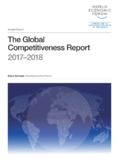Transcription of Big Data Executive Survey 2018 - NewVantage …
1 Page |1. Big Data Executive Survey 2018. Executive Summary of Findings Data and Innovation How Big Data and AI are Driving Business Innovation With a Foreword by Thomas H. Davenport and Randy Bean NewVantage Partners LLC. Boston | New York | San Francisco | Austin | Charlotte Copyright 2018. Boston | New York | San Francisco | Austin | Charlotte Page |2. Foreword It's a new year, and with it comes a new set of responses to the NewVantage Partners annual Survey . This year the results are both more encouraging and more worrisome than in the past. Artificial Intelligence is now a well-established focus at these large, sophisticated firms. There is both a stronger feeling that Big Data and AI projects deliver value, and a greater concern that established firms will be disrupted by startups, than in past surveys. This year the Survey 's focus is both Big Data and artificial intelligence.
2 Terminology comes and goes, but the constant is a data explosion and the need to make sense of it. Big Data and AI. projects have become virtually indistinguishable, particularly given that machine learning is one of the most popular techniques for dealing with large volumes of fast-moving data. It's also the case that statistical approaches to AI deep learning, for example are increasingly popular. Therefore, we view traditional data analytics, Big Data, and AI as being on a continuum. Virtually all of the respondents (97%) say they are investing in these types of projects. Perhaps the best news in this Survey is that companies continue to derive value from their Big Data and AI projects. 73% of respondents said they have already received measurable value from these initiatives. That number is half again higher than in the 2017 Survey , which suggests that more value is being achieved as companies grow familiar with the technologies.
3 The types of value received are perhaps consistent with other previous types of technology. Consistent with our view that Big Data and AI are extensions of analytical capabilities, the most common objectives and those most likely to achieve success are advanced analytics/better decisions. Better customer service and expense reduction are also common objectives. The theme of this year's Survey is How Big Data and AI are driving business innovation. If the maxim holds true that innovation happens at the edges and few firms lead and many follow, this year's Survey results would seem to bear this out. While a subset of firms, just over a quarter (27%), are prioritizing innovation initiatives innovation/disruption, speed-to-market, and monetization innovation remains an aspiration for most large enterprises. To date, just over half of respondents ( ) confirm that they are undertaking innovation initiatives in at least one of these areas.
4 Notably, data monetization, which has been a stated objective of many firms, remains a relatively low priority ( ) with a low success rate ( ) as of this time. Consequently, one of the greatest issues for concern in the Survey for large enterprises is the risk of disruption from new entrants. Almost four in five respondents said they feared disruption or displacement from firms like those in the fintech sector or firms specializing in big data. The technology judged most disruptive is AI by far. 72% chose it as the disruptive technology with the most impact far more than cloud computing (13%) or blockchain (7%). Another important and continuing issue is the slow speed with which these established firms make the shift to a data-driven culture. Virtually all respondents say their firms are trying to make the shift, but only about a third have already succeeded at this objective.
5 This issue is emphasized every year in the surveys, and doesn't improve much. Boston | New York | San Francisco | Austin | Charlotte Page |3. Clearly firms need more concerted programs to achieve data-related cultural change. Many startups have established data-driven cultures from their beginning, which is a key reason why firms fear disruption from them. One of the approaches that firms have established to deal with data-driven disruption and change is to establish new management roles. Every year, for example, the percentage of firms with Chief Data Officers rises. However, there is still a lack of clarity about how different data-oriented roles relate to each other and even what types of backgrounds are appropriate for CDO jobs. Role clarity is critical for both leading AI/Big Data projects and accomplishing cultural change.
6 And while all respondents believed it important, the majority of firms still lack an enterprise data strategy. This continuing rise in the importance and challenges of Big Data is one of the most important features of the contemporary economy and society. The Survey results over time provide interesting and useful documentation of this revolution. The key to success is to determine how your firm should respond and then to move ahead to execute the needed changes in a systematic and effective fashion. Thomas H. Davenport and Randy Bean January 2018. Boston | New York | San Francisco | Austin | Charlotte Page |4. Introduction In 2012, NewVantage Partners initiated the first Executive Survey aimed at senior Fortune 1000. business and technology decision-makers on the topic of Big Data. The Survey was conducted at the behest of a group of senior Fortune 1000 executives who sought to understand this new thing called Big Data, and understand its emerging impact on the corporate mainstream, in contrast to the emerging Tech Giants for whom data was their lifeblood and reason for being.
7 For the corporate mainstream, would Big Data be a disruptive force or a passing phase? The Survey was especially targeted to financial services firms, which are information businesses and have a long history of managing data as an asset. Upon publication of the 2012 Survey , author Thomas H. Davenport called the Survey one of the few I have seen that focuses on large organizations and offers responses from C-level executives . And, so it has remained. This is our 6th Survey of senior corporate executives on the topic of data. But, events evolve and businesses move forward. As Big Data has entered the corporate mainstream, it has served to fuel and empower advances in the adoption of Artificial Intelligence (AI) and other forms of cognitive learning --- machine learning, deep learning, et al. In addition, firms have begun to more actively consider how data can be used to innovate, as mainstream firms fight to withstand the challenges of their data-driven upstart rivals.
8 Big Data is not going away. The volume and sources of new data only continue to proliferate. Data is now more prevalent than ever. So the focus will continue to shift to ways in which data can be used for competitive advantage better decision making, business agility, and innovation. The 2018 Survey , entitled Data and Innovation: How Big Data and AI are Driving Business Innovation focuses on some of the most critical issues that mainstream companies are facing today: How can we leverage our own data assets to compete against data-driven rivals? How can we combine our data with new AI solutions to become nimble and smarter? What obstacles prevent us from transforming into data-driven businesses? How do we build a data-culture within our organizations? What is the appropriate role and mandate for the Chief Data Officer?
9 We are pleased to report that nearly 60 Fortune 1000 or industry leading firms are represented in our 2018 Survey , and that C- Executive participation has never been higher. This Survey has over the past 6 years reflected the evolution of Executive perspectives as they have come to terms with the impact of Big Data, and its implications. We hope that you find the results insightful. Boston | New York | San Francisco | Austin | Charlotte Page |5. 2018 Survey Participating Firms Nearly 60 leading firms participated in this year's Executive Survey . These firms represent a blue chip list of the leading banks, insurance, credit, and asset management firms, which represent among the leading users of data in the mainstream economy. In addition, emerging users of data, including pharmaceutical and medical organizations, and as well as firms representing a range of industries have participated.
10 Among the first time participants in 2018 are Farmers Insurance, Goldman Sachs, GlaxoSmithKline, IBM, Motorola, and Verizon. A full list of the 2018 Executive Survey participants follows. Financial Services | Insurance Aetna Fannie Mae Putnam Investments AIG Farmers Insurance Regions Bank Ally Financial Fidelity Investments Standard & Poors American Express First Republic Bank State Street Bank of America Freddie Mac Sun Life Financial Bank of China Goldman Sachs Swiss Re Group Bank of Montreal The Hartford TD Bank Bloomberg JP Morgan TIAA. Capital One Lincoln Financial Travelers Charles Schwab M&T Bank UBS. Cigna Met Life USAA. CitiGroup MFS Investments VISA. Citizens Bank Moody's Wells Fargo Crawford Morgan Stanley Zions Bank Credit Suisse Nasdaq Pharma | Medical Other Industries Astellas Estee Lauder Linked In GlaxoSmithKline Ford Motors Motorola H3 Biomedicine Global Energy Verizon OptumLabs IBM.




![Nationwide DestinationSM [C] (formerly known as …](/cache/preview/8/2/8/6/8/c/b/3/thumb-82868cb327fcfb1ca7fb0fcbd070fea1.jpg)
